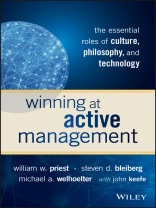Winning at Active Management conducts an in-depth examination of crucial issues facing the investment management industry, and will be a valuable resource for asset managers, institutional consultants, managers of pension and endowment funds, and advisers to individual investors. Bill Priest, Steve Bleiberg and Mike Welhoelter all experienced investment professionals, consider the challenges of managing portfolios through complex markets, as well as managing the cultural and technological complexities of the investment business.
The book’s initial section highlights the importance of culture within an investment firm – the characteristics of strong cultures, the imperatives of communication and support, and suggestions for leading firms through times of both adversity and prosperity.
It continues with a thorough discussion of active portfolio management for equities. The ongoing debate over active versus passive management is reviewed in detail, drawing on both financial theory and real-world investing results. The book also contrasts traditional methods of portfolio management, based on accounting metrics and price-earnings ratios, with Epoch Investment Partners’ philosophy of investing on free cash flow and appropriate capital allocation.
Winning at Active Management closes with an inquiry into the crucial and growing role of technology in investing. The authors assert that the most effective portfolio strategies result from neither pure fundamental nor quantitative methods, but instead from thoughtful combinations of analyst and portfolio manager experience and skill with the speed and breadth of quantitative analysis. The authors illustrate the point with an example of an innovative Epoch equity strategy based on economic logic and judgment, but enabled by information technology.
Winning at Active Management also offers important insights into selecting active managers – the market cycle factors that have held back many managers’ performance in recent years, and the difficulty of identifying those firms that truly possess investment skill. Drawing on behavioral economic theory and empirical research, the book makes a convincing case that many active investment managers can and do generate returns superior to those of the broad market.
विषयसूची
Preface xi
Active Management is Not Dead Yet
Part I Culture
Chapter 1 Culture at The Core 3
The Original Organizational Culture: Command-and-Control 5
An Alternative Culture for Knowledge Businesses 8
The Partnership Culture Model 10
Justice and Fairness 17
Chapter 2 Culture in Investment Management 21
Values 22
Integrity 26
Trust 28
Culture and Clients 32
Firm Culture under Stress 34
Culture in Recruiting 35
Acquisitions 38
Evolution of Culture 41
Part II Philosophy and Methodology
Chapter 3 The Nature of Equity Returns 49
Linkages: The Real Economy and the Financial Economy 49
Components of Stock Returns 51
Price-Earnings Ratios 53
The Historical Makeup of Stock Returns 59
Chapter 4 The Great Investment Debate: Active or Passive Management? 63
The Debate Is Timeless 65
An Elegant Theory: The Capital Asset Pricing Model 66
Further Elegance: The Efficient Market Hypothesis 68
Reality Intrudes 69
The Problem with MPT 71
Chapter 5 A More Human Description of Investors and Markets: Behavioral Finance 73
Loss Aversion 74
Mental Accounting 75
Minimizing Regret 76
Overconfidence 77
Extrapolation and Reversal 78
Investor Behavior in Action 78
MPT Still Lives 80
Chapter 6 Active Versus Passive Management: The Empirical Case 85
Market Regimes 87
Correlation and Dispersion 87
Company Quality 89
The Weight of Cash 90
Luck versus Skill 91
Investors Voting with Their Dollars 96
Chapter 7 The Case for Active Management 101
April 2015: Investment Giants Square Off in New York City 101
An Active-Passive Equilibrium 103
The Case for Active Management 105
Chapter 8 Debates On Active Managers’ Styles and Methods 109
Manager Style 110
Free Cash Flow Is the Measure of Value 112
Depreciation 113
Accruals 114
Research and Development Costs 118
The CFO Perspective 120
Chapter 9 The Jump from Company Earnings to Stock Prices 125
Flaws in Traditional Valuation Measures 125
Accounting versus Finance: A Case Study 128
Chapter 10 Epoch’s Investment Philosophy 133
The Starting Point: Generating Free Cash Flow 134
Choosing to Reinvest 135
Capital Investment: Returns and Capital Costs 136
Once More: Cash Flow-Based Measures Are Superior 139
Trends in Capital Allocation 142
Dividends 143
Share Repurchases 145
Debt Buydowns 150
Capital Allocation: What’s the Right Mix? 151
Part III Technology
Chapter 11 High-Speed Technology 159
Information Technology: Three Relentless Forces 162
Chapter 12 Technology in Investing 171
Information at Work 172
Order from Chaos: Applying Scientific Frameworks 172
Computers to the Rescue 174
A Virtuous Circle 176
Expansion of Index Funds 177
Betting Against the CAPM 177
Concurrent Developments 179
The Spread of Quant 181
Computing and Data, Neck and Neck 181
Big Data—Beyond Bloomberg 183
Artificial Intelligence 187
Chapter 13 The Epoch Core Model 191
Factors in the Epoch Core Model 192
Results of the Epoch Core Model 196
Chapter 14 Racing with The Machine 201
Investing Is Too Important for Robots Alone 201
Racing with the Machine 202
Seeking High Return on Capital 204
A More Practical Study 206
Is Persistence Contradictory? 208
An ROIC Strategy 211
The Value of Judgment 214
Epilogue 219
Appendix A: Selected Articles and White Papers of Epoch Investment Partners 223
Appendix B: Financial Asset Valuation 273
Appendix C: Feathered Feast: A Case 285
Acknowledgements 295
About the Authors 297
Index 299
लेखक के बारे में
WILLIAM W. PRIEST is Chief Executive Officer, Co-Chief Investment Officer, and a co-founder of Epoch Investment Partners, and a long-time advocate of free cash flow investing. His other books include Free Cash Flow and Shareholder Yield and The Financial Reality of Pension Funding Under ERISA.
STEVEN D. BLEIBERG is a Managing Director and Global Portfolio Manager at Epoch Investment Partners.
MICHAEL A. WELHOELTER is a Managing Director, Portfolio Manager, and Head of Quantitative Research and Risk Management at Epoch Investment Partners.












